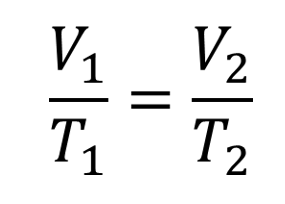A container with a volume of #14 L# contains a gas with a temperature of #140^o K#. If the temperature of the gas changes to #80 ^o K# without any change in pressure, what must the container's new volume be?
1 Answer
Assuming the container's volume is the same as and changes with that of the gas
New volume of container = 8 L
Explanation:
When dealing with changes in volume and absolute temperature with constant pressure, we should refer to Charles law.
Charles law states that at constant pressure, an ideal gas' volume is directly proportional to its temperature. This directly proportional relationship between volume and temperature can be written as: 
V1 = Inital volume of gas
T1 = Initial temp of gas (K)
V2 = Final volume of gas
T1 = Final temp of gas (K)
Using the formula in application to your question,
V1 = 14L
T1 = 140K
V2=?
T2 = 80K
The final/new volume of gas and container is 8L

